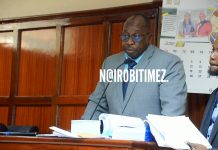BY SAM ALFAN.
The family of the late Dutch tycoon Tob Cohen have demanded an explanation over the withdrawal of murder charges against his widow Sarah Wairimu.
The family made the demand through their lawyers even as the Director of Public Prosecution (DPP) applied to withdraw the charge against Sarah and her co-accused wants Joseph Karanja.
This is after Director of Public Prosecution Noordin Haji informed the court he has filed a Nolle Prosequi and withdrawn the murder charge against Sarah Wairimu Kamotho and co-accused Peter Karanja.
“The DPP has directed that the matter be handled via inquest to be filed in the Chief Magistrate’s court Milimani , Nairobi. This will enable the contradictions that have affecting the proceedings of this matter to be heard in detail by all parties. In addition, this will provide an opportunity for parties to present any information that had not been explored substantially before court,” DPP Haji told the court.
Lawyers Danstan Omari and Cliff Ombeta did not oppose the withdrawal of the murder charge but demanded that the DPP to give details in writing as required by law.
“We are not opposing because the law gives the DPP the power to make this application but in equal the law demands the DPP provides reasons in writing to the victims that’s all,” Omari told the court.
The lawyers said a victim must be given reasons for entering a nolle prosequi.
“I wouldn’t matter so much in essence Justice Nyakundi pronounced himself that a victim is not a passenger for the states to just decide to charge the states decide to terminate the state decides to do the way it wants to do,” said Omari.
Omari added that there was no explanation and evidence or reasons provided to you.
“Let them put those reasons comply with that section, give it to the victim let us respond. My Lord has this question been faced by other high courts? Omari paused the question.
Cohen family lawyer further said that the emerging jurisprudent in Kenya is the constitutional provisions on victim rights and the enactment of the victim protection act 2014 section 9 subsection 1 of the act provides that a victim has a right to be informed in advance of the evidence, the provision and the defense intends to launch.
He added that the state must be accountable and article 10 the state must be transparent and the state must be responsible the public needs to know in writing the victim needs to know in writing so that the whole world knows the reason why the states want this matter to go to impose.
Lawyer Ombeta told Justice Daniel Ogembo that they only learnt of the decision to withdraw the charges through the social media.
He said the DPP should give reasons in writing so that they can respond otherwise the termination was not being done in good faith.
It was his submission that the public and the victim have to know in writing so that everyone can know why the DPP wants the matter to go to inquest.
Lawyer Cliff Ombeta told Justice Ogemba that article 157 is quite clear and when the DPP is exercising that power under the constitution he’s expected to be acting in good faith.
He said there was no information given to the victim at any particular stage on how this matter was considered and how this matter was arrived at to make that conclusion.
“My Lord and this is quite clear had it not been that we saw this on social media we would not have known it would have been water under the bridge,” Ombeta told the Judge.
Lawyer Ombeta questioned why the victim were not informed about prosecution decision to withdraw the murder charge against the two accused persons .
“Why were the victims not informed directly or indirectly through their lawyers? Or directly about it. This matter having been then written on the 29th to the court you will see clearly that it denies the victim an opportunity to be able to say something. It is not even 24hours, how do the victims digest this how do they respond how do they even start when they have no reason given quite clearly this cannot be in good faith,” Ombeta told the Judge.
Ombeta opposed application by Sarah Kamotho lawyer to handover the house to her adding that the crime scene remains a crime scene whether there is a trial or an quest.
“A crime scene still remains to be a crime scene and if what was preserved is still there then allowing an accused person to go back to that place there is a risk. Does the prosecution or the DPP realize this? I hope they will respond about it and we are not talking about ownership it is still a crime scene whether it belongs to the accused person or the family, the family is not going there and the accused person should not go there,” said Ombeta.
Lawyer Ombeta added that when the state realized they had come to know about the matter, they verbally created reasons for withdrawal as opposed to doing so in writing to all parties involved.
“It now became a crash programme for the state as a remedy. It became an ambush for the family. Had it not been for social media, we would not have known about it,” submitted lawyer Ombeta.
Why was the state being secretive about it? Why were counsels not informed and the victims? Ombeta questioned adding that prosecution move reeks of bad faith.
Ombeta submitted that justice not only goes to the accused person but also to the victims.
Sarah Wairimu’s lawyer Philip Murgor did not opposed the move by the state.
Murgor said that many cases were filed on the promise and undertaking of DCI George Kinoti to avail evidence.
He told the court that he wrote more than six letters to the investigating officer and DPP calling for independent investigations.
He accused former DCI boss George Kinoti of tapping phones of defense counsels and judges handling the matter because they did not have any evidence.
Murgor asked the court to order the police to hand the matrimonial home which is the scene of crime, to Sarah Wairimu.
He also asked the court to order refund of cash bail she had deposited, her passport and her dog which was taken to Kenya Society for protection and care of animals by the police.
In response, the DPP told the court that they acted in good faith.
The court also heard that the issues of evidence raised can be canvassed at the inquest.
The DPP asked the court to allow the application and have the matter registered as inquest in the lower court.
The ruling will be delivered on December 6, 2022.







